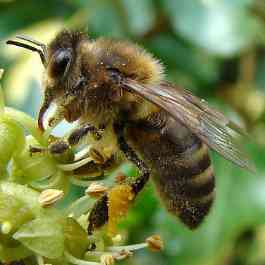Beekeeping
As with most hobbies the costs can vary considerably and it is easy to be persuaded to buy equipment you don’t need. Secondhand equipment is readily available giving the beginner the opportunity to get started for a reasonable sum. It is advisable to seek sound advice before buying bees or equipment as mistakes are easily made, and not always easy to rectify. The main hive product of interest to most people of course is honey, and in this part of the world it is reasonable to expect annual yields of 50-60 lbs per colony. It is a pity that more use is not made of honey as this will provide further interest. Honey can be used medicinally, in cookery and for a range of drinks including mead. For obvious reasons it is important that beehives are sited so they don’t cause a nuisance. Those who may be interested in beekeeping but have only got a small garden might like to consider an outapiary. These can take many forms but all that is needed is a small piece of land that is easily accessible, secure from animals, and not in a place where bees can fly at head height to annoy anyone.
|

